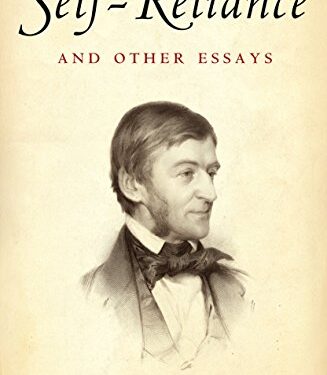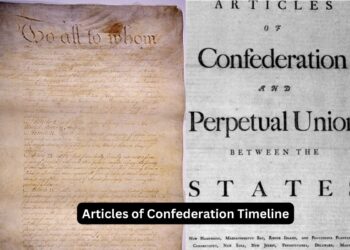“Self-Reliance” is an essay written by Ralph Waldo Emerson and first published in 1841. It is one of the most influential works of American literature and is considered a foundational text of transcendentalism, a philosophical and literary movement that emerged in the 19th century.
Self-Reliance Essays Summary By Ralph Waldo Emerson-The essay emphasizes the importance of individualism and self-reliance in society. Emerson argues that individuals should trust their own intuition and beliefs rather than conforming to the expectations and opinions of others. He encourages people to embrace their unique perspectives and talents and to express themselves authentically.
Emerson criticizes societal institutions and traditions that stifle individuality and hinder personal growth. He calls for people to reject conformity and embrace nonconformity, urging them to listen to their inner voice and follow their own path.
Also Read-
- A Supposedly Fun Thing I’ll Never Do Again Essays Summary By David Foster Wallace
- The Fourth State of Matter Essays Summary By Jo Ann Beard
- On Keeping A Notebook Essays Summary By Joan Didion
- Total Eclipse Essays Summary By Annie Dillard
Self-Reliance Essays Summary By Ralph Waldo Emerson-According to Emerson, self-reliance involves relying on one’s own judgment and instincts rather than relying on external authorities or conventions. He encourages individuals to think for themselves, question established norms, and trust their own thoughts and experiences.
Emerson also discusses the concept of self-trust, which he considers crucial for self-reliance. He believes that individuals should have confidence in their own abilities and convictions, even if they go against the opinions of society. He argues that self-trust leads to self-confidence and personal growth.
Self-Reliance Essays Summary By Ralph Waldo Emerson-Throughout the essay, Emerson emphasizes the importance of individuality and the potential for greatness within each person. He believes that by embracing self-reliance, individuals can tap into their inner resources and achieve personal fulfillment and success.
In summary, “Self-Reliance” is an essay by Ralph Waldo Emerson that advocates for the importance of individualism, self-reliance, and nonconformity. Emerson encourages individuals to trust their own judgment, embrace their unique perspectives, and reject societal expectations. He argues that self-reliance and self-trust are essential for personal growth and fulfillment.
About Ralph Waldo Emerson
Ralph Waldo Emerson (1803-1882) was an American essayist, philosopher, poet, and lecturer who is considered one of the most influential figures in American literature. He was born in Boston, Massachusetts, and grew up in a Unitarian family. Emerson’s father died when he was only eight years old, and he was raised by his mother and aunt.
Self-Reliance Essays Summary By Ralph Waldo Emerson-Emerson attended Harvard College, where he studied a wide range of subjects, including philosophy, literature, and science. After graduating, he became a minister and served as a pastor for several years. However, he eventually left the ministry to pursue a career as a writer and public speaker.
Self-Reliance Essays Summary By Ralph Waldo Emerson-Emerson was one of the leading figures of the transcendentalist movement, which emerged in the 19th century. Transcendentalism emphasized the importance of intuition, self-reliance, and the inherent goodness of humanity. Emerson’s writings and lectures embodied these ideals, and he became known for his philosophical essays that explored topics such as individualism, nature, and the relationship between the individual and society.
His most famous essay, “Self-Reliance,” along with other works such as “Nature,” “The American Scholar,” and “The Divinity School Address,” established him as a leading intellectual of his time. Emerson’s writing style was characterized by his poetic language, powerful imagery, and profound insights into human nature and the human experience.
Self-Reliance Essays Summary By Ralph Waldo Emerson-Emerson was also a mentor and friend to other notable figures of the time, including Henry David Thoreau, Margaret Fuller, and Walt Whitman. He continued to write and lecture throughout his life, covering a wide range of subjects such as philosophy, politics, and culture.
Self-Reliance Essays Summary By Ralph Waldo Emerson-Ralph Waldo Emerson’s works had a significant impact on American literature and thought, and his ideas continue to resonate today. His emphasis on individualism, self-reliance, and the power of nature has had a lasting influence on subsequent generations of writers, thinkers, and activists. Emerson’s legacy as a leading figure of American transcendentalism and his contributions to the development of American literature are widely recognized and celebrated.
Conclusion
Self-Reliance Essays Summary By Ralph Waldo Emerson-“Self-Reliance” by Ralph Waldo Emerson is a powerful and influential essay that advocates for individualism, self-reliance, and nonconformity. Emerson’s message continues to resonate today, as he encourages individuals to trust their own judgment, embrace their unique perspectives, and reject societal expectations.
Self-Reliance Essays Summary By Ralph Waldo Emerson-By promoting self-trust and the importance of following one’s own path, Emerson’s essay inspires personal growth, self-confidence, and the pursuit of individual fulfillment.
Self-Reliance Essays Summary By Ralph Waldo Emerson-“Self-Reliance” remains a foundational text of American literature and continues to offer valuable insights into the nature of the self and the pursuit of authenticity in our modern society.
FAQ.
Q: What is the main message of “Self-Reliance”?
A: The main message of “Self-Reliance” is the importance of individualism, self-reliance, and nonconformity. Emerson urges individuals to trust their own judgment, embrace their unique perspectives, and reject societal expectations.
Q: When was “Self-Reliance” written?
A: “Self-Reliance” was written by Ralph Waldo Emerson and was first published in 1841.
Q: What is transcendentalism?
A: Transcendentalism is a philosophical and literary movement that emerged in the 19th century. It emphasizes the inherent goodness of humanity, the spiritual and intuitive aspects of knowledge, and the importance of individualism and self-reliance.
Q: Why does Emerson criticize societal institutions and traditions?
A: Emerson criticizes societal institutions and traditions because he believes they stifle individuality and hinder personal growth. He encourages individuals to question established norms and trust their own thoughts and experiences.
Q: What does Emerson mean by self-trust?
A: Self-trust, according to Emerson, is having confidence in one’s own abilities and convictions, even if they go against the opinions of society. It is the belief in one’s own judgment and the willingness to follow one’s own path.
Q: How does “Self-Reliance” encourage personal growth?
A: “Self-Reliance” encourages personal growth by urging individuals to tap into their inner resources, embrace their unique perspectives, and trust their own instincts. By doing so, individuals can achieve personal fulfillment and reach their full potential.
















